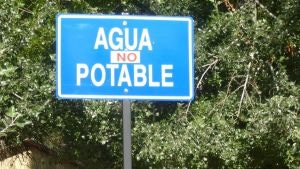Mar 23 2017
 Caution, no drinking water. Only 0.3 % of the water on the Earth�s surface is suited for use as drinking water. KIT scientists study possibilities of improving wastewater use. (Photo: KIT)
Caution, no drinking water. Only 0.3 % of the water on the Earth�s surface is suited for use as drinking water. KIT scientists study possibilities of improving wastewater use. (Photo: KIT)
A team of researchers from the “Water-Energy Group” of Karlsruhe Institute of Technology (KIT) are studying possibilities to eliminate the issues relating to wastewater.
Wastewater is considered to be of no use. Washing water is said to an average temperature of 30 °C. Toilet water can be used not only for producing fertilizers or biogas but also as valuable resources that otherwise is dumped in the sewer system unused. What is worse is that annually, over 2 million people die from diarrheal diseases because of the wrong use of wastewater.
Although water covers around 72% of the Earth’s surface, only 0.3% can be utilized as drinking water.
With that in mind, wastewater is no waste. It contains thermal energy, chemical energy in the form of carbon compounds, and valuable plant nutrients. Now, we have to develop processes for the use of these resources.
Helmut Lehn, Institute for Technology Assessment and Systems Analysis (ITAS)
Waste heat of domestic wastewater, for example, might be used with the aid of heat exchangers in sewage pipes. “And it is even more effective to use the warm wastewater from the washing machine and the bathroom directly in the house for preheating fresh water for the shower,” Witold Poganietz adds, who leads the research group together with Lehn. This sort of a system already exists in a housing block in Berlin.
A key prerequisite for the intelligent use of wastewater is the separation of wastewater flows from the toilet (black water) and from the kitchen and bathroom (grey water), Lehn explains. If feces were eliminated separately and undiluted – by using, for example, vacuum toilets as on airplanes or ICEs – three liters of biogas could be created from one liter of wastewater.
Adding biowaste might even increase the energy yield and the organic waste bin would no longer be required. Urine is an ideal fertilizer, as it contains nitrogen, potassium, and phosphorus.
Helmut Lehn, Institute for Technology Assessment and Systems Analysis (ITAS)
As the latter is thought to be a non-renewable resource that might run short even before coal and petroleum, studies focus on recovering it from municipal sewage sludge and wastewater. This might also help decrease the demand for artificial fertilizers, whose manufacture requires a lot of energy.
According to Franka Steiner, ITAS, the current infrastructure will continue to require multifaceted cleaning of mixed wastewaters, whereas separation of wastewater flows could be executed easily in development areas, where new houses are constructed. This also relates to growing city areas in threshold and developing countries.
“Here, sanitary systems are often lacking completely,” the geoecologist says.
Across the globe, she advises municipal administrations in the planning of wastewater systems. A separation system that generates both energy and nutrients from the wastewater of several thousand dwellers is being tried by the city of Hamburg in a conversion area. This project is being closely viewed by ITAS researchers with great interest.
UN World Water Day Commemorates the Millions of Deaths Due to Wrong Use of Wastewater
To draw attention to the global wastewater issue, the motto “Wastewater” was selected for 2017’s “United Nations World Water Day” on March 22. According to the World Health Organization (WHO), diarrheal diseases due to the wrong use of wastewater cause 4 % of all deaths globally, with growing tendency.
Among the annual two million victims or more, many are children living in developing countries, Lehn says. In 2015, approximately 440,000 people died due to malaria (half as many as 15 years before) and 1.1 million people died due to AIDS. ITAS researcher Lehn feels that one of the reasons for the surge in fatal diarrheal diseases is advancing urbanization with more and more people living in densely packed urban slums without proper wastewater treatment.
ITAS Informs Citizens about Potential Uses of Wastewater
On Thursday, May 11, 6 to 9 p.m., people can visit the ITAS building (Karlstraße 11, 76021 Karlsruhe) to obtain information about potential uses of wastewater. Researchers from the “Water-Energy Group” and consultants in the wastewater and development aid sectors are invited to offer advice.
“Citizens will be informed about our current wastewater treatment system, potential alternative uses of wastewater, and the steps that have to be taken by house owners and municipalities,” Helmut Lehn says.
Relationships of Water, Energy, and Waste: ITAS Simulation at the World Water Week
At the World Water Week in Stockholm from August 27 to September 01, 2017, the Water-Energy Group of ITAS will demonstrate a simulation. Over 3000 visitors from around the world are expected to attend the event under the motto of “Water and waste – reduce and reuse.”
“Our simulation will highlight technoeconomic, sociocultural and ecological relationships of water, energy, and waste and we plan to design concepts for various urban contexts,” Jasmin Friedrich says, whose studies include the water–energy nexus.
KIT Educates Specialists for the Sustainable Use of Water
Another contribution to solving global water issues is KIT’s master’s program “Water, Science & Engineering.” KIT offers interdisciplinary, research-oriented education at the interface of natural sciences and hydrological engineering. The program transfers expert knowledge in water engineering and natural sciences, including hydrological engineering and hydraulics, water technology and urban water management, environmental systems science, and water resources management.
The program is of universal character with a number of the courses being in English. Graduates qualify for responsible activities at industrial companies, planning and engineering offices, in the public service sector, science, and international development cooperation.